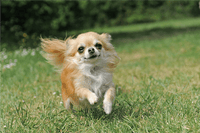Poodle Joint Health: Standard, Miniature or Toy poodles
Saskia OstermeierAs active and energetic dogs, Poodles are predisposed to certain joint health issues that can impact their quality of life.
Their elegance in movement and keen alertness make Poodles standouts in various dog sports and activities. Whether it's a Toy, Miniature, or Standard Poodle, each variant brings its unique traits and health considerations, especially regarding joint health.
Poodles, renowned for their distinctive curls and high intelligence, are among the most versatile and agile dog breeds.
Their lean bodies of Poodles and lively spirits demand a joint care approach that goes beyond basic nutrition and exercise. Innovative care strategies tailored to their specific needs can play a crucial role in maintaining their agility and vitality throughout their lives.
Tailoring Joint Health Strategies to Poodle Varieties
Poodles come in three main sizes-Toy, Miniature, and Standard-each with unique physical characteristics and health needs. Understanding these differences is key to developing tailored joint health strategies that effectively address the specific joint concerns of each size Poodle.
Size-Specific Joint Health Concerns in Poodles
- Toy Poodles: Due to their small size, Toy Poodles are particularly susceptible to patellar luxation, a condition where the kneecap dislocates or moves out of its normal location. Proactive measures such as maintaining a healthy weight and incorporating gentle exercises can help manage this risk.
- Miniature Poodles: Miniature Poodles often face issues like hip dysplasia despite their compact size. Ensuring they engage in low-impact activities and receive supplements that promote joint health can be beneficial.
- Standard Poodles: As the largest of the trio, Standard Poodles are more prone to developing conditions like hip dysplasia and elbow dysplasia. Structured exercise programs that include swimming and other non-weight-bearing activities can help reduce stress on their joints.
Preventive Measures and Early Diagnosis of joint issues in Poodles.
Implementing preventive measures and ensuring early diagnosis through regular veterinary checks can significantly impact the joint health of Poodles. Techniques include:
- Regular Screening: Early screening for joint problems can help in managing potential issues before they escalate. This can include physical examinations and periodic X-rays or other imaging techniques.
- Customized Exercise Regimens: Based on the specific needs of the Poodle's size, customized exercise regimens can help maintain joint function and prevent the development of joint problems.
- Nutritional Adjustments: Adjusting the diet to include age-specific and size-specific formulations enriched with joint-supporting nutrients like omega-3 fatty acids, glucosamine, chondroitin and / or green lipped mussel can support overall joint health.
The Role of Diet in Managing Joint Health in your Poodle
A well-managed diet not only supports the physical health of Poodles but also plays a crucial role in preventing the onset of joint issues. Nutritional strategies should be:
- Proactively Managed: Don't wait for joint issues to arise before adjusting your Poodle's diet. Integrate joint-supportive nutrients early, especially if your breed is prone to specific joint ailments.
- Regularly Evaluated: As your Poodle ages, their dietary needs will change. Regular evaluations with a nutritionist or veterinarian can ensure their diet continues to meet their evolving health requirements.
Engaging in your Poodle Smart Exercise
For Poodles, whose intelligence and agility are as renowned as their beauty, exercise is about more than just physical activity-it's about engaging their minds while supporting their joints. Smart exercise routines can provide both mental stimulation and physical health benefits, particularly for joint care.
Recommended Activities for Poodles
- Agility Training: This is an excellent way for Poodles to engage their minds and bodies. Agility courses that emphasize controlled movements can help strengthen muscles around the joints without excessive strain.
- Puzzle-Based Toys: Incorporating puzzle toys that require movement to solve can be an excellent way to keep your Poodle active and mentally stimulated. These toys encourage movement in a fun and engaging way, helping to maintain joint health and cognitive sharpness.
- Gentle Fetch: Modified fetch games that use soft, easy-to-catch objects can be ideal for maintaining joint health. Encouraging your Poodle to engage in short bursts of running with periods of rest can provide the benefits of exercise without the risk of joint stress.
Incorporating technology can enhance the effectiveness of exercise routines for joint health:
- Activity Trackers: Wearable technology can help monitor a Poodle's activity levels, providing insights into their mobility and helping to tailor exercise routines appropriately.
- Interactive Exercise Equipment: Devices that stimulate your Poodle to move in specific ways can be programmed to ensure they are getting the right type and amount of exercise for their joint health.
Balancing Exercise with Rest for your Poodle
While exercise is crucial, balancing it with adequate rest is equally important for joint health:
- Scheduled Downtime: Ensure your Poodle has scheduled downtime after activities to recover. Providing a comfortable resting area where they can relax and rejuvenate is essential.
- Monitoring for Signs of Fatigue: Watch for signs of overexertion, such as reluctance to engage in usual activities, which could indicate joint stress or fatigue. Adjust exercise routines as needed to prevent overstrain.
Ensuring the joint health of your Poodle involves a thoughtful combination of advanced nutrition, smart exercise, and the integration of modern technology. By embracing these innovative strategies, you can provide a comprehensive care regimen that not only maintains but enhances your Poodle's mobility and quality of life.
Recap of Key Joint Care Strategies for any size Poodle
- Advanced Nutrition: Implementing a diet rich in joint-supporting nutrients like hyaluronic acid, collagen, and omega-3 fatty acids is essential for maintaining healthy joints and overall vitality.
- Smart Exercise: Engaging your Poodle in mentally stimulating and physically appropriate activities helps strengthen their muscles and joints, reducing the risk of joint issues.
- Technology Integration: Utilizing wearable devices and apps to monitor activity and health can provide valuable insights into your Poodle's well-being, allowing for timely adjustments to their care.
Each Poodle is unique, and their care should reflect their individual needs.
Customising their diet, exercise routines, and health monitoring based on their specific age, size, and health status ensures that they receive the most effective support possible.







